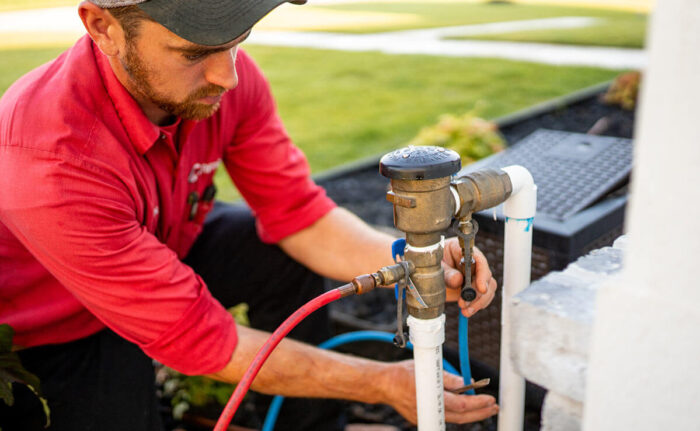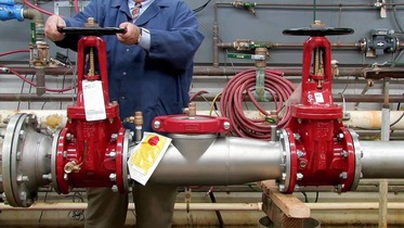Have you been in search of tips concerning Backflow Prevention?

Yes, you need to backflow test your home's water supply to ensure that the water is without toxic substances and hazardous degrees of chemicals. Because of the tools needed and space for mistake, you ought to not attempt to carry out heartburn screening by yourself. We advise that you call an expert plumber every couple of years to test your water.
What is Heartburn?
Simply put, heartburn is when water moves upwards-- the opposite direction in the plumbing system. This is also referred to as "backpressure." When the water relocates this direction, it can combine with harmful toxic substances as well as pose a threat.
What Triggers Heartburn?
A common cause of heartburn is a loss of water pressure that creates the water to siphon back right into the water. An example is clearing out a paint container using a hose. You fill the paint pail up with water, leaving the hose in the pail. After time, there is a loss in water pressure and also the hose pipe begins to draw the water back into the supply of water. As you can think of, there are now chemicals from the paint that are going into the supply of water, potentially posing a threat. Unfortunately, many people are not also familiar with backflow testing, but there are several reasons that it's so crucial.
Heartburn Screening is Called For by Legislation in Particular Cities
Depending on where you live, you could really be called for by regulation to backflow examination your regulation. Iowa City maintains a document of all buildings offered by the city's water supply.
You Can Avoid Backflow
If you have an expert plumber mount a backflow gadget, hazardous heartburn is conveniently avoidable. The plumber will certainly also examine for backflow and establish if there is an active hazard. The major function of a heartburn device is to prevent water from moving backward right into your water system. Plumbers install the gadget on the pipes in your home to guarantee that the water just moves in the right instructions.
Heartburn Can Impact Both You and Your City
Numerous cities develop heartburn guidelines due to the fact that hazardous backflow can affect the public water system in addition to a single building. Modern-day cities have backflow tools in location that protect the water supply that comes from a lot of homes as well as industrial properties. The genuine danger comes from watering systems, which can harm the water supply with hazardous fertilizers, manure, as well as other chemicals.
Call a Plumber to Test for Heartburn Before It is Far too late
While it may seem grim, contaminated water can lead to awful microbial as well as viral infections that are hard to treat. A plumbing firm can quickly check your house's water to identify if there are any kind of hazardous chemical levels. If you can prevent the misery that comes from consuming alcohol polluted water, the tiny financial investment is. As well as if you do uncover that your water has high degrees of toxins, a plumber can quickly set up a heartburn prevention tool.
Yes, you need to backflow examination your residence's water supply to make sure that the water is free of toxic substances and damaging degrees of chemicals. A typical reason of heartburn is a loss of water stress that causes the water to siphon back into the water supply. After some time, there is a loss in water stress and the hose pipe starts to draw the water back right into the water supply. The main purpose of a heartburn gadget is to prevent water from flowing in reverse right into your water supply. Many cities establish backflow guidelines due to the fact that dangerous backflow can affect the public water supply in addition to a solitary structure.
WHY DOES BACKFLOW TESTING NEED TO BE DONE EVERY YEAR
What Is Backflow?
Toxic gas backing up into a building is one example of potential backflow issues, but backflow can occur in many other ways.
Backflow is generally referred to as the reversal of a liquid or gas in a plumbing system.
Most issues for the public occur with backflow resulting in contaminated drinking water. If you look up backflow issues online you’ll probably find references to “potable” water. That means drinking water.
There have been backflow issues in the past with drinking water. Chemicals, sewage and other contaminants have found their way into drinking water causing health issues for those that count on the fresh water.
What Causes Backflow?
In a residence or commercial building water generally flows one way. This normal flow is usually driven by consistent pressure in the water and waste system.
Anything that changes the normal pressure in the system can lead to backflow.
Fire hydrant use or malfunction can reverse the normal pressure in the system on a city line, but backflow can occur in a number of different ways.
Sometimes backpressure might be caused by someone using a garden hose and submerging the end of the hose in a pool of liquid. If pressure is lost the flow could reverse and contaminants could be released into the drinking water.
Anytime there is a connection between contaminants and the drinking water there is potential for a backflow issue. Sometimes these connections are not immediately obvious like the garden hose connecting to a building’s drinking water supply.
Backflow Regulations
The Environmental Protection Agency (EPA) provides guidelines and regulations for state and local governments regarding backflow. State and local governments also have their own guidelines and regulations for backflow prevention.
Arizona has its own backflow regulations.
Due to issues with backflow in the past, regulations require backflow preventer devices to be used in nearly all residential and commercial buildings.
A backflow preventer is a device that prevents backflow as cross-connection points where potential backflow issues may occur.
While backflow is not a common occurrence, preventers are in place to make sure there is no contamination should something malfunction or go wrong with a building’s water supply.

We hope you liked our post on What is Backflow Testing?. Thank you so much for taking the time to read our posting. Enjoyed our blog entry? Please share it. Help other people locate it. Thanks a lot for taking the time to read it.
We're your solution!
Comments on “Should I Perform a Backflow Test on My Water”